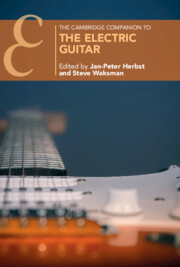Book contents
- The Cambridge Companion to the Electric Guitar
- Cambridge Companions to Music
- The Cambridge Companion to the Electric Guitar
- Copyright page
- Contents
- Figures
- Tables
- Contributors
- 1 Introduction
- Part I History
- Part II Technology and Timbre
- Part III Musical Style and Technique
- Part IV The Electric Guitar in Society
- Part V The Global Instrument
- Personal Take V: Azmyl Yunor
- 16 African Electrical Networks
- 17 Rhythm, Rasta, Rock, and “Electric Avenue”: The Electric Guitar in Anglo-Caribbean Popular Music
- 18 The Electric Guitar in Southeast Asia: A Serpentine Path
- Index
- References
16 - African Electrical Networks
from Part V - The Global Instrument
Published online by Cambridge University Press: 08 November 2024
- The Cambridge Companion to the Electric Guitar
- Cambridge Companions to Music
- The Cambridge Companion to the Electric Guitar
- Copyright page
- Contents
- Figures
- Tables
- Contributors
- 1 Introduction
- Part I History
- Part II Technology and Timbre
- Part III Musical Style and Technique
- Part IV The Electric Guitar in Society
- Part V The Global Instrument
- Personal Take V: Azmyl Yunor
- 16 African Electrical Networks
- 17 Rhythm, Rasta, Rock, and “Electric Avenue”: The Electric Guitar in Anglo-Caribbean Popular Music
- 18 The Electric Guitar in Southeast Asia: A Serpentine Path
- Index
- References
Summary
This chapter approaches the history of electric guitar music in sub-Saharan Africa through the perspective of the “new organology,” considering the unique imbrication of materiality and sociality within the cultural work of music. Multiple local and transnational networks impact the work of guitarists, including the movement of musicians, economic systems that circulate instruments, and the circulation of musical knowledge, genre, and instrumental technique. Networks are both embedded in the landscape—such as electrical infrastructure—and lay atop the physical, such as mobile data and social media applications. The author draws upon ethnographic interviews with guitarists from Ghana and Congo to show how these networks of circulation and the materiality of instruments can provide new ways of thinking about guitar music in Africa and the African diaspora.
- Type
- Chapter
- Information
- The Cambridge Companion to the Electric Guitar , pp. 289 - 305Publisher: Cambridge University PressPrint publication year: 2024

